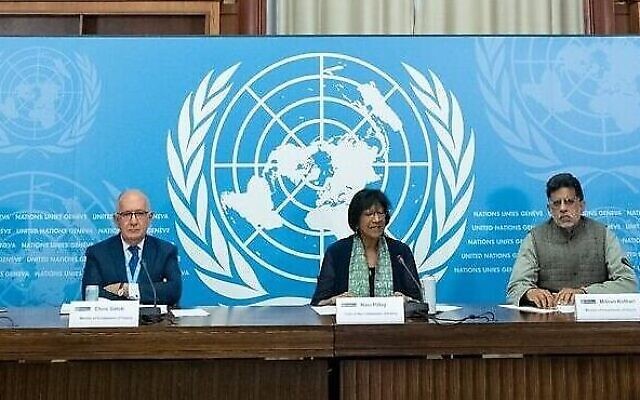Commission says ‘permanent’ Israeli control of ‘occupied territories’ illegal under international law; document fails to mention words ‘Hamas,’ ‘rockets’ or ‘terrorism’
The United Nations’ ongoing Commission of Inquiry investigating rights abuses in Israel, the West Bank and the Gaza Strip following last year’s 11-day fight between Israel and Hamas in Gaza, releases its second report on Thursday, calling on the Security Council to end Israel’s “permanent occupation,” and on individual UN member states to prosecute Israeli officials.
The 28-page report, which will be presented to the General Assembly on October 27, accuses Israel of violating international law by making its control over the West Bank permanent, and by annexing land claimed by the Palestinians in Jerusalem and the West Bank, and Syrian land in the Golan Heights.
“Actions by Israel constituting de facto annexation include expropriating land and natural resources, establishing settlements and outposts, maintaining a restrictive and discriminatory planning and building regime for Palestinians and extending Israeli law extraterritorially to Israeli settlers in the West Bank,” reads the report.
It also accuses Israel of discriminatory policies against Arab citizens, of stealing natural resources, and of gender-based violence against Palestinian women.
The commission cited “reasonable grounds” to conclude that Israel’s presence in the West Bank “is now unlawful under international law due to its permanence” as well as the Israeli government’s “de-facto annexation policies.”
“By ignoring international law in establishing or facilitating the establishment of settlements, and directly or indirectly transferring Israeli civilians into these settlements, successive Israeli governments have set facts on the ground to ensure permanent Israeli control in the West Bank,” said Navi Pillay, a former UN human rights chief who chairs the commission.
The authors requested an urgent advisory opinion from the International Court of Justice “on the legal consequences of the continued refusal on the part of Israel to end its occupation,” and an investigation from the International Criminal Court prosecutor.
The report does not mention the words “Hamas,” “rockets,” or “terrorism.”
Israel has refused to cooperate with the commission and has not granted it entry into Israel or access to Palestinian-controlled areas in the West Bank and Gaza.
Israel’s mission to Geneva rejected the report, saying: “Commissioners who made antisemitic comments and who proactively engaged in anti-Israel activism, both before and after their appointment, have no legitimacy nor credibility in addressing the issue at hand.”
The embassy added that the report damages the UN’s credibility and its human rights mechanisms.
Pillay heads the open-ended inquiry and is joined by Miloon Kothari of India, the first UN special rapporteur on adequate housing, and Australian international human rights law expert Chris Sidoti.
Kothari caused an uproar after he was quoted on a podcast this summer speaking out against the “Jewish lobby” and questioning Israel’s inclusion in the UN, sparking Israeli accusations of antisemitism and calls for his resignation. Pillay defended Kothari and said his comments had been deliberately contextualized. Kothari has since apologized.
Sidoti had previously dismissed accusations of antisemitism against the commission and said these were being “thrown around like rice at a wedding.”
The commission was established last year during a special session of the council in May 2021 — following fighting between Israel and Palestinian terrorists in the Gaza Strip — when the UN Human Rights Council tasked the body with an investigation into “all alleged violations of international humanitarian law and all alleged violations and abuses of international human rights law” in Israel, East Jerusalem, the West Bank and Gaza.
The commission was the first to have an open-ended mandate from the UN rights body — rather than be tasked with investigating a specific crime — and critics say such permanent scrutiny shows anti-Israel bias in the 47-member-state council. Proponents support the commission as a way to keep tabs on injustices faced by Palestinians under decades of Israeli rule.
Its first report, an 18-page document released in June, blamed Israel’s “persistent discrimination against Palestinians” for violence between the two sides.
In Washington on Thursday, State Department spokesman Ned Price did not address the findings of the experts’ report but reiterated standing US concerns about the UN commission.
“Israel is consistently unfairly targeted in the UN system, including in the course of this commission of inquiry,” he told reporters. “No country, the record of no country, should be immune from scrutiny, but no country should also be targeted unfairly. And that’s the principle that we seek to uphold.”
B’nai B’rith International, a 180-year-old Jewish organization, also criticized the commission of inquiry and said in a statement Thursday that commission members “patently do not see a need even to pretend to conduct their ‘inquiry’ objectively.”
The organization charged that the report “cites only non-governmental organizations stridently critical of Israel, none that focus on Palestinian abuses of Israelis’ or Palestinians’ human rights,” and thus largely ignores Israeli deaths and harms to civilians.
Following Kothari’s comments this summer, Israel called to immediately disband the commission. Prime Minister Yair Lapid said in late July that the commission was “fundamentally tainted by the publicly expressed prejudices of its leadership, who do not meet the basic standards of neutrality, independence, and impartiality required by the United Nations,” he said.
Israel justifies its policies, including the blockade on the Gaza strip (alongside Egypt), as security measures needed to stop terrorism. The Palestinians claim the West Bank, east Jerusalem and Gaza — territories captured by Israel in the 1967 war — for an independent, future state.




